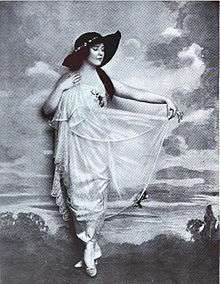Phoebe Foster
Phoebe Foster (born Angeline Egar; July 9, 1896 - June 1975)[1] was an American theater and film actress.
Phoebe Foster | |
|---|---|
 Portrait of Foster in Vanity Fair (March 1916) | |
| Born | Angeline Egar July 9, 1896 |
| Died | (aged 78) Boston, Massachusetts, U.S. |
| Years active | 1914-1939 |
| Spouse(s) | Harold LeRoy Whitney (1927-1943) |
Career
Foster studied at the American Academy of Dramatic Arts. She began appearing on Broadway in 1914, starting with a production of Roi Cooper Megrue's Under Cover. Her subsequent Broadway appearances included The Cinderella Man (1916), Three's a Crowd (1919), Captain Applejack (1921), The Jazz Singer (1925), and Topaze (1930).[2][3]
After appearing in a couple of short films, in 1931 she made her feature film debut in George Cukor's Tarnished Lady alongside Tallulah Bankhead. That same year she also appeared in Edmund Goulding's The Night Angel with Nancy Carroll and Fredric March. In 1933, she was in the comedies Our Betters and Dinner at Eight, both directed by Cukor. Two years later she appeared in the Tolstoy adaptation Anna Karenina with Greta Garbo. In 1935 she also returned to Broadway for the brief run of Living Dangerously. In 1936 she had her first stage appearance in London, starring in a production of Night of January 16th. Foster's last movie was The Gorgeous Hussy in 1936. Her final Broadway production was American Landscape (1938).
Personal life
Foster was born in 1896 as Angeline Egar (possibly Eager)[notes 1] in Center Harbor, New Hampshire. She was the daughter of Arthur and Emily Egar.[4][5]
Foster married millionaire Harold LeRoy Whitney, heir to an ironworks fortune, on September 12, 1927. Whitney had divorced his previous wife just days before.[6] The couple kept the marriage secret for several days before the press discovered it.[4] They filed for divorce in 1943.[7] Phoebe Foster died in 1975 in Boston, Massachusetts.
Credits
Broadway
- 1914: Under Cover
- 1915: Under Fire
- 1915: Back Home
- 1916: The Cinderella Man
- 1917: The Lassoo
- 1917: The Gipsy Trail
- 1918: By Pigeon Post
- 1919: First is Last
- 1919: Three's a Crowd
- 1921: Toto
- 1921: Captain Applejack
- 1924: Garden of Weeds
- 1924: High Stakes
- 1925: The Jazz Singer
- 1926: The Donovan Affair
- 1927: Interference
- 1929: Scotland Yard
- 1929: The Amorous Antic
- 1930: Topaze
- 1930: That's the Woman
- 1930: The Truth Game
- 1931: Cynara
- 1935: Living Dangerously
- 1938: Bachelor Born
- 1938: American Landscape
Film
- 1919: An Honorable Cad (Short)
- 1930: Grounds for Murder (Short)
- 1931: Tarnished Lady as Germaine Prentiss
- 1931: The Night Angel as Theresa Masar
- 1933: Our Betters as Princess
- 1933: Scarlet River as Phoebe Foster (uncredited)
- 1933: Dinner at Eight as Miss Alden
- 1935: Anna Karenina as Dolly
- 1935: O'Shaughnessy's Boy as Girl on Camel in Parade (uncredited)
- 1936: The White Angel as Mrs. Elizabeth Herbert
- 1936: The Gorgeous Hussy as Emily Donaldson (uncredited) (final film role)
Notes
- Sources differ as to whether the family name was spelled 'Egar' or 'Eager'.
References
- "Phoebe Foster Net Worth". Celebrity.Money. Retrieved March 27, 2016.
- Hischak, Thomas S. (2003). Enter the Players: New York Stage Actors in the Twentieth Century. Lanham, Maryland: Scarecrow Press. pp. 114–15. ISBN 0-8108-4761-2. OCLC 51848777.
- "Phoebe Foster profile". Internet Broadway Database. Retrieved June 5, 2014.
- "Actress Is Bride of Harold Whitney". The Bee. Danville, Virginia. AP. September 15, 1927. p. 3.
- Room, Adrian (2010). Dictionary of Pseudonyms: 13,000 Assumed Names and Their Origins. Jefferson, North Carolina: McFarland. p. 182. ISBN 978-0-7864-5763-2. OCLC 663110495.
- "Paris Divorce Granted to Mrs. H. L. Whitney". The New York Times. September 6, 1927. p. 2.
- Randolph, Nancy (November 19, 1943). "To Devote Life to Stage, Let Pink Tea Parties Go". Buffalo Courier-Express. p. 11.
External links
| Wikimedia Commons has media related to Phoebe Foster. |